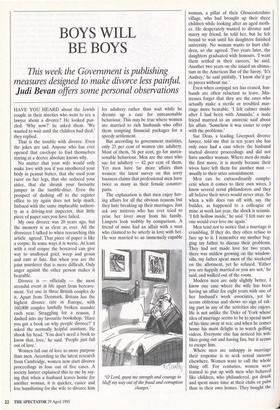BOYS WILL BE BOYS
This week the Government is publishing measures designed to make divorce less painful.
Judi Bevan offers some personal observations HAVE YOU HEARD about the Jewish couple in their nineties who went to see a lawyer about a divorce? He looked puz- zled. 'Why now?' he asked them. 'We wanted to wait until the children had died,' they replied.
That is the trouble with divorce. Even the jokes are sad. Anyone who has ever opened that envelope to find themselves staring at a decree absolute knows why.
No matter that your wife would only make love with you if you smothered your body in peanut butter, that she used your razor on her legs, that she seduced your sister, that she shrunk your favourite jumper in the tumble-drier. Even the prospect of dashing off to the register office to try again does not help much. Imbued with the same implacable authori- ty as a driving-test inspector, that little piece of paper says you have failed.
My own divorce was 20 years ago, but the memory is as clear as ever. All the divorcees I talked to when researching this article agreed. That piece of paper is like a corpse. In some ways it is worse. At least with a real corpse the bereaved can give way to unalloyed grief, weep and groan and rant at fate. But when you are the joint murderer that is more difficult. Only anger against the other person makes it bearable.
Divorce is — officially — the most stressful event in life apart from bereave- ment. Yet one in three British couples do it. Apart from Denmark, Britain has the highest divorce rate in Europe, with 160,000 couples lawfully broken asunder each year. Struggling for a reason, I dashed into my favourite bookshop. 'Have you got a book on why people divorce?' I asked the normally helpful assistant. He shook his head. 'You don't need a book to know that, love,' he said. 'People just fall out of love.'
Women fall out of love to more purpose than men. According to the latest research from Cambridge, women now start divorce proceedings in four out of five cases. A society lawyer explained this to me by say- ing that when a husband leaves home for another woman, it is quicker, easier and less humiliating for the wife to divorce him for adultery rather than wait while he dreams up a case for unreasonable behaviour. This may be true where women are married to rich husbands who offer them tempting financial packages for a speedy settlement.
But according to government statistics, only 23 per cent of women cite adultery. Most of them, 56 per cent, go for unrea- sonable behaviour. Men are the ones who sue for adultery — 42 per cent of them. Yet men have far more affairs than women: the latest survey on this sorry business claims that professional men have twice as many as their female counter- parts.
The explanation is that men enjoy hav- ing affairs for all the obvious reasons but they hate breaking up their marriages. Just ask any mistress who has ever tried to prise her lover away from his family. Limpets look wobbly by comparison. A friend of mine had an affair with a man who claimed to be utterly in love with her. He was married to an immensely capable "0 Lord, grant me strength and courage to bluff my way out of the fraud and corruption charges.' woman, a pillar of their Gloucestershire village, who had brought up their three children while looking after an aged moth- er. He desperately wanted to divorce and marry my friend, he told her, but he felt bound to wait until his daughters finished university. No woman wants to hurt chil- dren, so she agreed. Two years later, the daughters graduated with honours. 'I want them settled in their careers,' he said. Another two years on she issued an ultima- tum in the American Bar of the Savoy. 'It's Audrey,' he said pitifully, 'I know she'd go to pieces without me.'
Even when conjugal sex has ceased, hus- bands are often reluctant to leave. Mis- tresses forget that they are the ones who actually make a sterile or troubled mar- riage more bearable. 'I felt calmer inside after I had been with Amanda,' a male friend married to an anorexic said about his affair. 'Somehow it was easier to cope with the problems.'
Sue Deas, a leading Liverpool divorce lawyer, told me that in ten years she has only once had a case where the husband started divorce proceedings and did not have another woman. Where men do make the first move, it is mostly because their wives have left them for another man usually to their utter astonishment.
Men can be extraordinarily compla- cent when it comes to their own wives. I know several serial philanderers and they all believe their wives would never stray. So when a wife does run off with, say, the builder, as happened to a colleague of mine at work last year, the shock is seismic. `I felt hollow inside,' he said. 'I felt sure no one would ever love me again.'
Men tend not to notice that a marriage is crumbling. If they do, they often refuse to face up to it. I remember my mother beg- ging my father to discuss their problems. They had not made love for two years, there was mildew growing on the window- sills, my father spent most of the weekend on the allotment, yet he refused. 'Either you are happily married or you are not,' he said, and walked out of the room.
Modern men are only slightly better. I know one case where the wife has been having an affair for eight years with one of her husband's work associates, yet he seems oblivious and shows no sign of tak- ing part in any of the activities she enjoys. He is not unlike the Duke of York whose idea of marriage seems to be to spend most of his time away at sea; and when he comes home his main delight is to watch golfing videos. Everyone else has noticed his wife likes going out and having fun, but it seems to escape him.
Where men are unhappy in marriage their response is to seek sexual succour elsewhere. Women want to call the whole thing off. For centuries, women were trained to put up with men who behaved like children, who philandered, got drunk and spent more time at their clubs or pubs than in their own homes. They bought the deal whereby in return for financial sup- port they would provide clean shirts, apple-cheeked heirs, supper on the table and a little light frottage against the frigidaire. Women did not have very high opinions of themselves. Then along came the pill and proper jobs for girls. We rushed off to become lawyers, journalists and accountants.
Work delivered not just financial inde- pendence, but friends and status too. Women's collective self-esteem shot up and so did the divorce rate. Between 1961- 70, the number of decrees absolute rose by 120 per cent to 58,000 a year. From the enforcement of the Divorce Reform Act in 1971-80 it leapt another 99 per cent to 148,000. From there it levelled off, hitting 159,000 in 1991.
According to Sue Deas, many women now feel that having a husband is like hav- ing an extra child in the house — and if that extra child provides no joy, why both- er? 'I know I can survive financially and look after the children on my own,' said a former neighbour of mine after throwing out her husband. His final act of self-indul- gence had been to barricade himself in the living-room with a jug of dry Martini and turn on the gas.
But most men still demand to be moth- ered. Feminism may have triumphed among the metropolitan intelligentsia, but in two thirds of British households the bulk of the chores are done by women, whether they work or not.
Five years ago an old university friend of mine married for the third time. Just like his two former wives, the new model was a pretty, elfin type. Just like them, she decorated her house with taste and style. We all shook our heads and waited for the cracks to appear.
None has. Unlike his previous wives, this one cooks dinner every night, buys all his clothes, massages his feet and openly declares her jealousy of any attractive women that come near him. He is truly happy for the first time.
In How to Keep Your Man Monogamous, the psychiatrist John Train gives this advice: 'A woman must realise that her mate is part boy, part adolescent, part man. The boy in him wants to know she cares for him, the adolescent that he is the object of her whole sexuality and the mature man that she is proud of him.'
Perhaps that explains why men quite often leave for a woman the same age or even older. The Prince of Wales is a case . in point; so is my second husband. I make no claims to be a mother-earth figure. But I know more than I did. As I have got older, I have developed a much clearer idea of what I want from a marriage, what I expect from my husband and what I am prepared to give.
The first time around I put up with all kinds of nonsense. I told myself my hus- band's penchant for other men was rather chic, that he would learn to tell the differ- ence between truth and fiction and that our rows were on a par with Zelda and Scott Fitzgerald's. In fact, we were like two tiny tots. We had great fun wrecking the nurs- ery but it ended in tears when there was no nanny to clear up the mess.
Too many marriages end like this. Or there is the parent/child set-up. Either the woman plays Mummy and panders to all her little boy's needs at the expense of her own, or, as in Ibsen's The Doll's House, the man plays Daddy, solving all his little girl's problems, so she never needs to think for herself. Sooner or later someone rebels and it is off to the lawyer.
The Government's White Paper on divorce, published this week, aims to take the sting out of divorce by removing 'fault' and minimising the 'adversarial' aspect. It proposes mediation aimed at protecting children, to help couples to work towards the best solution. It hopes to save some marriages and Nit an end to 'quickie' divorces by making couples wait at least a year.
Anything that makes the whole business less painful is welcome. But how about making couples wait a year before they tie the knot — a return, in other words, to the old-fashioned engagement? That way there might be fewer dead marriages to bury.



























































 Previous page
Previous page